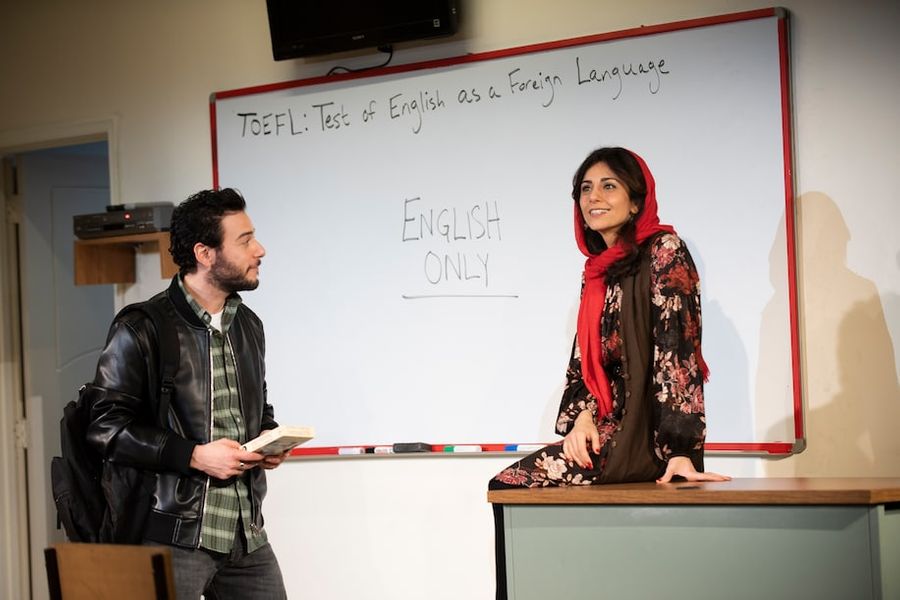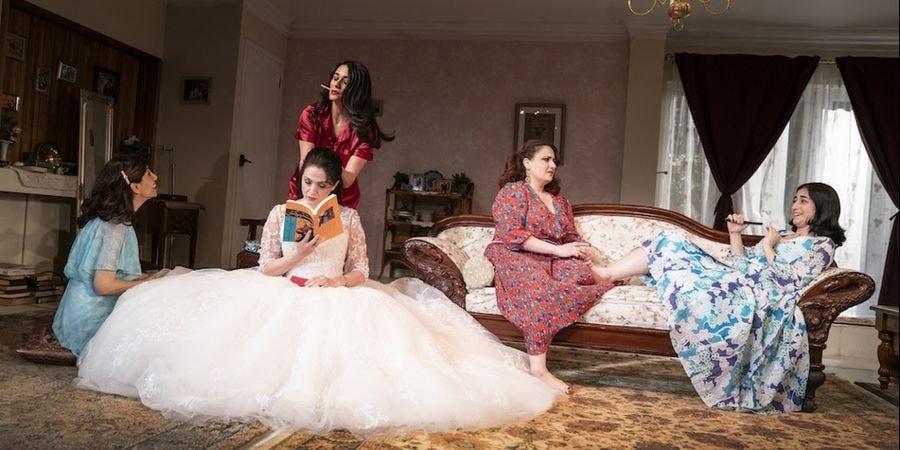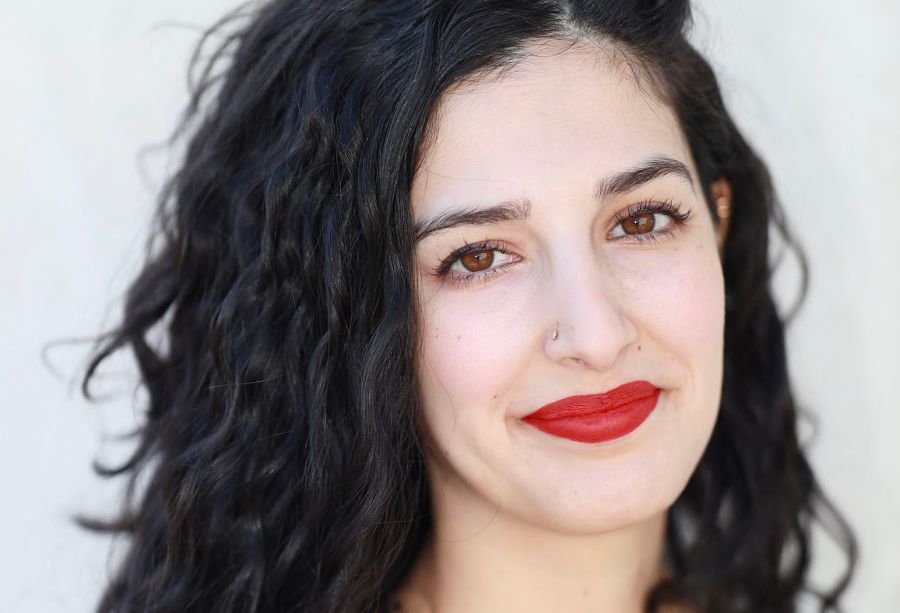Sanaz Toossi describes her newest play, Wish You Were Here, as a love letter to her mother, who immigrated to the U.S. from Iran in the mid-’80s following the Iranian Revolution. Still, she was nervous when she shared the script with her mom. The play follows a group of female friends who live through the Revolution while trying to keep things as normal as possible: shaving each other’s legs, styling each other’s hair, and talking frankly about the state of their vaginas. (Sample dialogue: “It smells like the ocean in here. Who’s on their period? This is a day-two, day-three aroma we have going.”)
Was it too frank, Toossi wondered? To her pleasant surprise and relief, her mom not only loved the play, she wanted it to go further. “She was like, ‘It can get even more inappropriate! Don’t let anyone scare you into telling you that’s not how we speak,’” Toossi recalled one morning in the offices at Playwrights Horizons before a rehearsal. “It was, like, the best thing she could have said.”
Wish You Were Here follows closely on Toossi’s Off-Broadway debut, English, which made a splash at the Atlantic Theater Company in February and March (in a co-production with Roundabout Theatre Company). It was nominated for best play by the Lucille Lortel Awards and the Drama League Awards. Wish You Were Here has already extended its Playwrights run through May 29 (a previous version of the play was released last May as an audio play by Audible).
Toossi, who graduated from NYU Tisch’s playwriting program in 2018 and is only 30, is already experiencing a meteoric rise, with commissions from Williamstown Theatre Festival, Manhattan Theatre Club, South Coast Repertory, IAMA Theatre, and Oregon Shakespeare Festival. She was also one of the writers for the upcoming Amazon Prime television series A League of Their Own, based on the film of the same name.
Despite her relative youth, Toossi is hyper aware of a lot of things: how much her career hinges on the success of this present moment, how meaningful it is that her plays about the Middle East are getting produced, and how—Toossi hates this part especially—“surprising” it is for her to be writing Middle Eastern stories that are comedies.
“Someone said to me once, when they were talking about [Wish You Were Here], they were like, ‘The way these women talk, you’re making a point, right? That Muslim women, Middle Eastern women, speak this way,’” Toossi recalls, visibly perturbed. “Is it making a point when you’re just representing your own life? I don’t know. I just feel like that’s only something that would be tagged on a playwright of color, like, ‘Oh, you’re making a point talking about the very basic aspects of your life.’” And then she said something that was both brutally accurate and entirely unexpected, given the calmness of her tone: “People are more comfortable seeing, in a Middle Eastern play, a sexual assault onstage than a woman having her own period.”
That kind of out-of-left-field-but-so-truthful-it-hurts sensibility peppers Toossi’s plays too. Her breakout hit English takes place in a classroom in Iran, where citizens of different ages are learning English. It’s a concept rife for laughs, linguistic misunderstanding being well-worn fodder for comedy. Audiences do laugh initially: at students playing word games or having basic conversations in accented English about their favorite color. This lulls us into a state of comfort, though, for simple but powerful truths that knock us off our axis. As when the teacher, Marjan, remarks on the difficulty of keeping two languages in her brain: “My English, my Farsi—these two languages, they [war] in my head. And the Farsi is winning. Do you know, sometimes I think you can only speak one language? You can know two but…I feel like I’m disappearing.” Here, the bracket represents a word the character cannot find—a hyper-realistic flourish that mirrors how in real life, unlike in a play, it’s not always possible to find the right words.
In that moment English becomes not just a comedy about language lessons but a meditation about language itself, both as a tool of communication but also as an aspect of identity. About how, in learning another language, you can gain a new skill but you also lose a part of yourself. And how, if you do not have the vocabulary in a language to express yourself, you will always be a little bit incomplete, never truly knowable by others. As someone who is bilingual but always feels my own native language on the verge of slipping away (as I do not use it every day), and with it a part of myself, Toossi’s words cut to the bone.

To Playwrights Horizons artistic director Adam Greenfield, it’s “reductive” to position Toossi’s work as being notable primarily on grounds of representation. He compares Toossi to Annie Baker. Like Baker, he said, Toossi crafts dialogue that is “very, very funny” that was “tickling me and delighting me as writing.” But then, like Baker, Toossi builds to a point “where the play turns and begins to become about something you didn’t realize it was about.” Though he can’t quite pinpoint where in Wish You Were Here it “begins to shift in the action, and the play that you think you’re watching becomes a different play. It’s something that feels very mysterious to me. I don’t know how she knows how to do that.” When he first saw a reading of the play, Greenfield said he found himself laughing at the beginning and sobbing by the end.
Actor Marjan Neshat, a main actor in both English and Wish You Were Here, zeroes in on Toossi’s subtlety. “I feel like the way in which she’s doing it, with English, it was through a lot of restraint and tenderness and holding back,” Neshat said. “And in the holding back, things just got highlighted and people could take from it what they wanted.” In Wish You Were Here, she said, “There’s so much humor and raunchiness, in order to subtly have the loss and sorrow be in the backdrop.”
Toossi insists her plays are comedies, and she is very intentional about that. She grew up, she said, in the post 9/11 era, and depictions of the Middle East are typically “a really bleak, arid terrain, and the oud is playing,” she said with a chuckle, adding, “I’ll be real with you, I love Homeland—I’m not perfect.” But when she started writing her own plays, she made the deliberate choice that they would be funny, and while they would touch on loss and trauma, the stories would not be only about that.
Of course, Toossi is conscious that this makes her sound like she’s making a political statement. “What I wish my answer was is, ‘No, who I am as an artist is, ‘I’m funny, and I want my work to be funny, because I want to insist on my own individualism.’ But it’s not the truth,” she admitted, running her hands through her curly hair as she’s thinking. “The truth is that I grew up only seeing certain stories about Middle Easterners and I knew they weren’t true. And it always bothered me, and I couldn’t believe people just took them as fact. It bothered me to my core, and it still bothers me.”
Comedy, then, is Toossi’s way of disarming audience’s expectations. “When you label a Middle Eastern play a drama, I just think that people will go in with an idea of what that play means,” she said. “I am really trying to do as much as I can, to lead the conversation in how my work is talked about and how I am talked about.”
Neshat appreciates that Toossi’s plays don’t set out to explicate Iranian culture or teach us about the Revolution. Instead, in Wish You Were Here, the story centers on how five friends survive while their country is turned upside down—how they hide from bombs but still play board games to pass the time, and how they care for each other, even when they get their period blood on each other’s furniture.
“I think Middle Eastern actors, and brown plays, are tasked with explaining things or giving a history lesson,” said Neshat, who is also Iranian American. “It’s such a gift to not have to explain your culture, but just to be a human being and to be three-dimensional. I think the specific details make it richer, but also, there’s a lot that is universal.”

Toossi grew up in Orange County, Calif., raised by Iranian immigrants; her mom was a chemist, her dad an engineer. Southern California has the largest population of Iranians outside of Iran, so Toossi grew up around a community that spoke Farsi and hosted mehnooni (parties) every weekend.
“I remember being there every weekend and falling asleep on piles of coats, and having so much fun,” Toossi recalled, before deadpanning, “It’s kind of introvert hell but it’s also, like, beautiful.” She majored in pre-law at the University of California, Santa Barbara. What inspired her to switch from law to playwriting was Amy Herzog: Toossi had seen Herzog’s 4000 Miles at South Coast Rep, a modern dramedy about a young man and his grandmother reconnecting. It was structurally inventive, modern, tender, and also painfully relatable.
“I thought about it every day for, like, a whole year,” Toossi recalled. “I was like, these are actual people. I thought I could never be a playwright because playwriting is about showing people that you’re smart—that’s what I always thought it was.” And here’s that brutal honesty again: “It feels like a project to make everyone feel stupid.”
Toossi secretly applied to NYU, and when she was accepted, she told her mother, who surprised her by responding with, “Oh, thank God. I thought you were pregnant,” Toossi said, here adopting a light Iranian accent. “She just really wanted me to be happy. Both my parents did.”
After graduating from NYU, Toossi found herself footing through different writer’s groups and fellowships: Ensemble Studio Theatre’s Youngblood, the Middle Eastern American Writers Lab at The Lark, and Clubbed Thumb’s Early Career Writers’ Group. She also got a playwriting fellowship with Page 73.
As the old adage goes, “Write what you know,” for the typical first-generation immigrant writer, the go-to narratives circle around parent-child conflicts: the generational divides, the inherited trauma, or the pain of not being able to fully communicate because you literally don’t speak the same language.
English and Wish You Were Here are about the Iranian diaspora, but Toossi made an atypical choice: She set both plays in Iran, with some characters on the cusp of leaving and others who choose to stay. Both sides, then, experience a profound sense of loss. There’s a beautiful exchange in Wish You Were Here, between Nazanin, who chooses to stay in Iran after her best friends have departed, and a woman the script simply calls “New friend.”
Nazanin: More of us stayed than left. We’re in the majority.
New friend: I guess. Makes me feel so sad for them.
Nazanin: I don’t feel sorry for them. I mostly feel this, like, thing in my throat and when it rises, the rest of the day feels long.
New friend: Well, you should. Feel sorry for them. They’re castaways.
The exchange contradicts the predominant immigration narrative in which immigrants are seen in the U.S., struggling to begin anew, with the home they left a memory, more a concept than a real place. But Toossi isn’t as fascinated with the struggles of characters who have already left as she is with why they leave, and the people they leave behind. Either way, there’s no judgment on which way is “better.”
Toossi summed it up thus: “I tell immigrant stories, but I don’t tell them in the United States. How can we tell immigrant stories from the site of migration? I think for Iranians, this question of staying or leaving is huge, and it has affected every family so deeply. I think I always just wanted—needed—people to know the Iran that I know. The Iran that’s never ever portrayed in media or seen in the news.”
Toossi also confessed that her choice of setting is something of an avoidance tactic, as she’s still working through what it means to be Iranian American, to have grown up “in between.” She told me she did just finish writing a play about an Iranian American family living in Orange County. And though she declined to say how autobiographical it is, she said, with typically dry humor, that a character in the play who’s obsessed with crystals is “probably me—I’m a crystal person.” (Rose quartz helps her feel calm, she said.)
“Being Iranian in this country is huge,” Toossi continued. “There’s a lot of pain in having left, and there’s a lot of pain in being an outsider. And then there was joy, there was pride, and there was creation and a new identity. I haven’t really integrated all of those. I just want to braid that together for myself before I vomit it onto a page.” In short, she says, “I don’t have the language for it.”
Indeed, it all comes back to language for Toossi. The way the characters in her plays speak, words get dropped, filler words get added, sentences are left unfinished. It doesn’t mean the person saying them isn’t smart or worth listening to, it just means they’re human. And it also means that when they can finally figure out what they want to say, it pops out like a beacon.
“Not finishing your sentences because you don’t actually know what you mean, or you’re too afraid to say it or you wish you didn’t feel it—I like that. I like that kind of clunkiness with which we all speak,” said Toossi. “There’s so much language can’t do for us. And that’s okay. That’s not tragic to me. That’s just life. I want to let my characters be a little lost whenever they want to be lost, because I’m lost all the time. And I don’t think that means I’m stupid. You know, I just…” And here she trails off before admitting, with no self-consciousness but with brutal honesty: “I’m in process.”
Diep Tran is the former senior editor of this magazine. Follow her on Twitter @DiepThought


